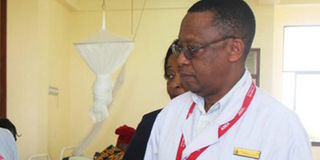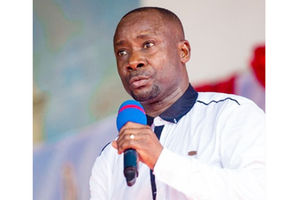Govt moves to curb shortage of neurosurgeons

MOI acting managing direct, Dr Samuel Swai
What you need to know:
- Currently Muhimbili Orthopaedic Institute (MOI) has only eight neurosurgeon doctors, which have been overwhelmed by the number of patients due to the sensitivity of that kind of surgery.
Dar es Salaam. In an effort to increase the number of neurosurgeons, the government has reviewed the curriculum for medical students studying to become doctors in that area, in a move that will now see them spend only six years to complete the course down from the previous ten years.
Currently Muhimbili Orthopaedic Institute (MOI) has only eight neurosurgeon doctors, which have been overwhelmed by the number of patients due to the sensitivity of that kind of surgery.
MOI acting managing direct, Dr Samuel Swai, revealed on Monday, October 16, 2017, during the five-day 4th Hands-on Neurosurgery Neurotrauma and Critical Care Course involving neurosurgeons from Ethiopia, Kenya, Uganda, Tanzania and Malawi.
“The number of doctors in this area is very small compared with huge number of patients because in a day we can have between three and five patients who need brain surgery, many due to accidents,” said Dr Swai.
Further, he noted that following the shortage MOI submitted a request on change of curriculum to the Tanzania Commission for Universities (TCU) who approved it and students had already begun to study the course under the six-year system.
According to him, “basically medical studies are difficult but the course for brain surgery is even tougher because if you do something wrong you destroy everything. In previous years we studied for ten years,” he said.
He said currently only MOI could perform the neurosurgery at the high level. He added that in order to work on the shortage there was a need for at least two neurosurgeons in every referral hospital.
Due to the challenge the government sent at least 84 patients to India annually for brain-related treatment.
Speaking about the training, he said the course would help in enhancing skills for local doctors especially in the area of neurosurgery neurotrauma and critical care for accident patients.
Dr Swai said there were tens of doctors from countries attending the course, adding that in Tanzania private and government hospitals were taking part. He said the aim of the government was to reduce the number of patients being sent abroad.
Speaking when officially opening the training, Permanent Secretary in the ministry of Health, Community Development, Gender, Elderly, and Children, Dr Mpoki Ulisubisya, said it had come at a time when the government was planning to build capacity to its doctors.
The PS said the training would involve theory and theater practicals, whereby doctors will receive new skills in operating patients who are involved in accidents.
“These foreign doctors have offered a chance for our doctors to visit their hospitals to exchange skills,” he said.




